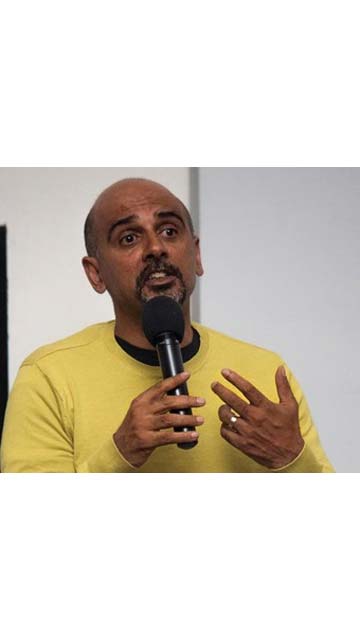
Despite the gruelling subject matter of Miners Shot Down, the message of the documentary which had its first public screening in Grahamstown this week, is one of hope.
The Barratt Lecture Theatre at Rhodes University echoed songs of support on Tuesday evening, for those who lost their lives during the confrontation between the South African Police Service (SAPS) and miners at Marikana in 2012.
Filmmaker Rehad Desai was present for the first screening open to the public of his documentary Miners Shot Down in Grahamstown on Tuesday 27 May.
The documentary, which looks at the days leading up to the tragedy as well as snippets from the Marikana Commission of Inquiry, was received with a standing ovation from the packed audience of Grahamstown residents, students and staff. The director, former Lonmin miner Sobopho Sibonile and Jim Nichols, a lawyer for the families spoke to Grocott's Mail after the screening.
"The intention of this film was to challenge the narrative that the police had no option but to fire in self-defence;' said Desai.
"It was a one-sided affair. Not one hair on the policemen s uniform[s] was harmed."
Sibonile told Grocott's Mail that one of the main triggers that led to the strike was the extreme conditions that miners were forced to endure in the mines.
"To work underground is very difficult;' Sibonile explained, "If you go underground, you have to pray to God, because I don't know if I go back or not."
Nichols, who represents the families of the slain miners at the Commission, said justice will only be achieved when the Commission acknowledges that the miners did not attack the police.
The documentary has premiered at many film festivals overseas including the New York African Film Festival, the Cannes Film Festival and the One World Film Festival, the largest human rights film festival in the world.
It has also won numerous awards, including the Camera Justitia Award at the Movies that Matter Festival held at the Hague and the Vaclav Havel Jury Award at the One World Film Festival in Prague.
The acclaimed documentary did not come without challenges and a steep price.
These included R5.5-million, 16 months on production, 3000 hours of footage and persuading a reluctant ANC deputy president (and now deputy state president), Cyril Ramaphosa, to step in front of the camera.
Ramaphosa was a large shareholder in Lonmin, the company that owns the platinum mine. As the documentary continues to be screened across the country, Desai's message is one of hope.
"To realise that these are human beings;' he said.
"The struggle is about building an inclusive and free South Africa. [We] can never be free until we learn to listen and respect one another's rights and these include economic rights to a living wage."
Miners Shot Down will go onto the cinema circuit today (Friday 30 May).
Article Source: Grocott’s Mail
Photo: Kate Janse van Rensburg
Director Rehad Desai in conversation with audience members after the screening of'Miners Shot Down' at Rhodes University on Tuesday night. The film is a documentary on the Marikana massacre at Lonmin, one of South Africa's biggest platinum mines, in August 2012.
